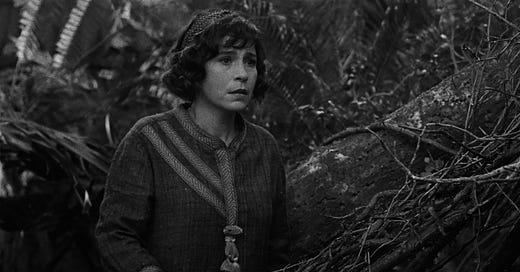Grand Tour (Miguel Gomes, 2024)
On a second look, Miguel Gomes’ Grand Tour is a much stranger film than I initially gave it credit for, even if it still remains a lesser entry in the Portuguese director’s body of work. For starters, what is it? A romantic anti-romance? A self-reflexive mytho-travelogue? Despite its clear, bifurcated structure, simple premise, and familiar Gomes-isms, Grand Tour is mischievously amorphous, filled with puckish tonal shifts that threaten and often disrupt its cohesion.
Returning to his interests in colonial ephemera and mythical storytelling, the film is structured as a romantic pursuit as Edward (Gonçalo Waddington), a representative of the British government stationed in colonial Myanmar, evades his fiancée of seven years, Molly (Crista Alfaiate) by traveling along the “Grand Tour”, a famous Pan-Asian tourism route. The first hour observes Edward’s delirious drift from Myanmar to Singapore, Thailand, Vietnam, The Philippines, Japan and China, while the latter follows the determined Molly, always just a step behind her cowardly would-be lover.
Mixing fiction and ethnographic documentary, Grand Tour is constructed from a combination of expressionist soundstage-set narrative sequences and present-day documentary footage captured by Guo Jing and Gomes’ regular cinematographer Sayombhu Mukdeeprom. If Grand Tour is obviously about something, it lies in the disconnect between these two modes, and how for both the more passive Edward and the headstrong Molly, there’s an inevitable gulf between the diegetic dreamscape they inhabit and the brilliance of the countries they’re traversing. “The white man is totally unable to understand Oriental culture. It transcends him” says a man Edward meets in an artificial bamboo jungle, and Gomes’ film all but confirms that assessment.
Contextualized as subconscious interludes, its the documentary footage that’s most exciting. Indeed, the rupture of cell phones, cars, and a viral Chongqing subway station all but state the persistence of the colonial imagination, but these sequences also feature a subterranean battle for subjectivity between the East and West, one that’s inherent to Grand Tour’s remote-directed production. The choice of images indulges in a proprietary exoticism, one which blurs countries, warps time, and excites in a touristic romanticism (we see kung fu, puppetry, dragon dances, a human-powered ferris wheel). This reaches a rapturous apogee early on, as Edward’s journey from Thailand to Vietnam is set to Strauss’ The Blue Danube. Dissolving between slow-motion footage of Thai motorcyclists, a whirling dragon dance, and a street-side Vietnamese crooner, Edward’s unwitting odyssey is portrayed as a classically European fever dream of Oriental delights. It’s the mannered near-parodic beauty of these images that makes them strangely difficult to surrender to, and Gomes arguably makes that part of the point. How does one disentangle their gaze from received colonial imagery?
Problematizing his own blinkered point of view, Gomes frames the entire film through local narrators. Throughout the interludes, they gain access to Edward and Molly’s internal monologues, recounting their exhaustion, indignation, and ultimately, their resignation. These narrators are practically omniscient, and occasionally wield their powers to comedic ends when they comment on moments of cultural missteps, such as when a group of Chinese seniors laugh at Edward’s terrible Mahjong moves. The omniscience puts the subjectivity of the entire film in question. Could the in medias res Burmese narration that opens the film suggest that this fatalist romance is in fact told from the perspective of present-day Asia, with Edward and Molly acting as a post-colonial haunting? Rather than provide answers, Gomes is mostly concerned with portraying the film’s suspended subconscious, presenting a colonial artifice that’s perennially aware of an elusive truth.
The qualifying framing is arguably the strongest link between Grand Tour’s dual modes, as one of the primary effects of the documentary narration is that it puts the paucity of Edward and Molly’s experience into perspective. Just as their present-day dreams are revealed as small, their mythical quests are defined by their set-bound solitude. Both Edward and Molly are driven by an inability to face their circumstances. Edward flees from the perpetual notion that Molly will catch up to him, while Molly chases a love that isn’t there. As Grand Tour undercuts the surface emotions of its narrative (doomed love, but also, as a character notes, the fall of the British Empire), it embodies the desire to transcend the self and truly see. The meta-cinematic gesture which concludes the film is then a narrative miracle and a subtextual tragedy. It’s a self-indicting recognition of the weight of history.
Grand Tour is now playing at the SIFF Uptown through 4/21 and available to stream on MUBI.




